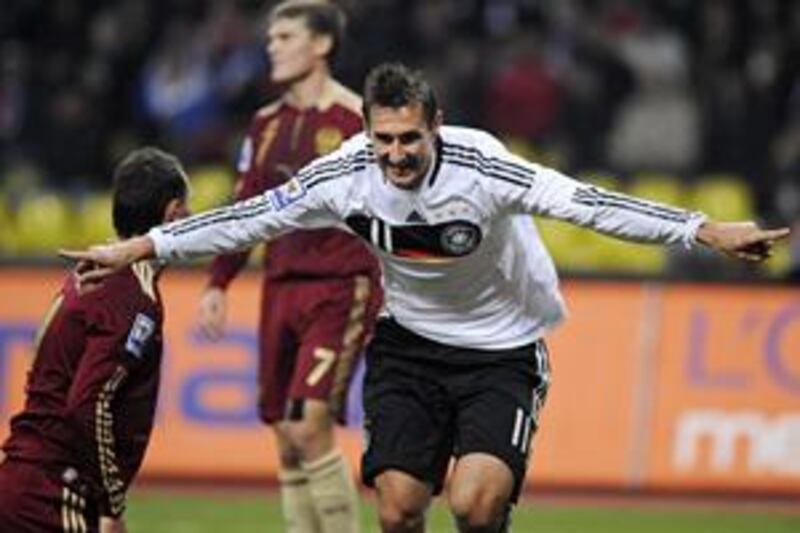MOSCOW // Time goes by, players come and go, and Germany keep being Germany. They secured their place at next summer's World Cup finals with a 1-0 win over Russia on Saturday, and they did it in the great German manner, through unobtrusive efficiency and obduracy. It may not win them huge numbers of friends, but it is effective: since 1954, they have never failed to qualify.
This present side are, if anything, even more typically German than their predecessors, packed, as the jibe has it, of players who would make good sons-in-law; clean-cut, clean-living strivers who have a clear sense of their responsibilities. The only dash of anything so outre as flair on Saturday came from Mesut Ozil and, while it is a dreadful burden for a 20-year-old to carry, it may be that his imagination could be the spark that fires Germany next summer.
Ozil was the key presence in Germany's success at the European Under 21 Championship in Sweden earlier in the year, and he has been a revelation at Werer Bremen, admirably filling the playmaker's role vacate by Diego when he moved to Juventus in the summer. He created the only goal of the game against Russia, crafting a opening by exchanging passes with Lukas Podolski on the edge of the box and then, having been forced a touch wide, drawing Igor Akinfeev, the goalkeeper, and squaring for Miroslav Klose to turn the ball over the line.
In a similarly vital qualifier against England two years ago, Russia had also gone in 1-0 behind at half-time, before hitting back thanks to a contentious penalty decision and some poor goalkeeping from Paul Robinson. On Saturday, as they had in that game, Russia introduced Roman Pavlyuchenko - who would surely have started ahead of the disappointing Alexander Kerzhakov but for a hamstring strain - and played with increased verve and fluency, but this time the penalty decisions went against them and, in Rene Adler, they met a goalkeeper in form.
Their coach, Guus Hiddink, insisted that a late barge by Michael Ballack on Andrey Arshavin was "100 per cent a penalty", and Vladimir Bystrov also seemed to have a case when he was tripped in the closing minutes. Without playing particularly badly, Bystrov had a game in which nothing seemed quite to go right for him, and he will be haunted by two incidents in the space of five minutes in the first half, as he first got in the way of an Arshavin through-ball that looked like setting Kerzhakov clear and then, having been laid through himself by Arshavin, he hit his shot tamely into the chest of Adler. The goalkeeper could also take credit for two fine saves from Arshavin, and an excellent parry low to his left from Igor Semshov.
Russia, though, were never able to generate the sort of rhythm they had in that game against England, or indeed at Euro 2008, and for that Germany must take credit: it is at that that they excel. To call it spoiling is to make it sound uglier or more underhand than it really is; they are simply very well-organised, diligent in their closing - Ballack and Simon Rolfes were both superb in front of the back four - and hold a sufficiently high defensive line that they are never subjected to the sort of sustained assault that eventually did for England.
Even after the 68th-minute sending off of the right-back Jerome Boateng for a second bookable foul on Bystrov, their defensive shape remained sound. Perhaps they rode their luck at times on Saturday, but then German teams always have. Russia, meanwhile, must trust to the play-offs. @Email:sports@thenational.ae





